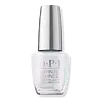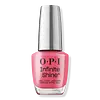What's inside
What's inside
 Key Ingredients
Key Ingredients

No key ingredients
 Concerns
Concerns

 Ingredients Side-by-side
Ingredients Side-by-side

Ethyl Acetate
PerfumingButyl Acetate
MaskingNitrocellulose
Acetyl Tributyl Citrate
MaskingTosylamide/Epoxy Resin
Isopropyl Alcohol
SolventAcrylates/Hydroxyesters Acrylates Copolymer
Stearalkonium Hectorite
Gel FormingSilica
AbrasiveSucrose Acetate Isobutyrate
Adipic Acid/Neopentyl Glycol/Trimellitic Anhydride Copolymer
Citric Acid
BufferingTin Oxide
AbrasiveDimethicone
EmollientCI 77891
Cosmetic ColorantEthyl Acetate, Butyl Acetate, Nitrocellulose, Acetyl Tributyl Citrate, Tosylamide/Epoxy Resin, Isopropyl Alcohol, Acrylates/Hydroxyesters Acrylates Copolymer, Stearalkonium Hectorite, Silica, Sucrose Acetate Isobutyrate, Adipic Acid/Neopentyl Glycol/Trimellitic Anhydride Copolymer, Citric Acid, Tin Oxide, Dimethicone, CI 77891
Ethyl Acetate
PerfumingButyl Acetate
MaskingNitrocellulose
Acetyl Tributyl Citrate
MaskingTosylamide/Epoxy Resin
Isopropyl Alcohol
SolventAcrylates/Hydroxyesters Acrylates Copolymer
Stearalkonium Hectorite
Gel FormingSucrose Acetate Isobutyrate
Adipic Acid/Neopentyl Glycol/Trimellitic Anhydride Copolymer
Methicone
EmollientCitric Acid
BufferingDimethicone
EmollientCI 77891
Cosmetic ColorantCI 15850
Cosmetic ColorantEthyl Acetate, Butyl Acetate, Nitrocellulose, Acetyl Tributyl Citrate, Tosylamide/Epoxy Resin, Isopropyl Alcohol, Acrylates/Hydroxyesters Acrylates Copolymer, Stearalkonium Hectorite, Sucrose Acetate Isobutyrate, Adipic Acid/Neopentyl Glycol/Trimellitic Anhydride Copolymer, Methicone, Citric Acid, Dimethicone, CI 77891, CI 15850
Ingredients Explained
These ingredients are found in both products.
Ingredients higher up in an ingredient list are typically present in a larger amount.
Acetyl Tributyl Citrate is a fragrance.
We don't have a description for Acrylates/Hydroxyesters Acrylates Copolymer yet.
We don't have a description for Adipic Acid/Neopentyl Glycol/Trimellitic Anhydride Copolymer yet.
We don't have a description for Butyl Acetate yet.
Ci 77891 is a white pigment from Titanium dioxide. It is naturally found in minerals such as rutile and ilmenite.
It's main function is to add a white color to cosmetics. It can also be mixed with other colors to create different shades.
Ci 77891 is commonly found in sunscreens due to its ability to block UV rays.
Learn more about CI 77891Citric Acid is an alpha hydroxy acid (AHA) naturally found in citrus fruits like oranges, lemons, and limes.
Like other AHAs, citric acid can exfoliate skin by breaking down the bonds that hold dead skin cells together. This helps reveal smoother and brighter skin underneath.
However, this exfoliating effect only happens at high concentrations (20%) which can be hard to find in cosmetic products.
Due to this, citric acid is usually included in small amounts as a pH adjuster. This helps keep products slightly more acidic and compatible with skin's natural pH.
In skincare formulas, citric acid can:
While it can provide some skin benefits, research shows lactic acid and glycolic acid are generally more effective and less irritating exfoliants.
Most citric acid used in skincare today is made by fermenting sugars (usually from molasses). This synthetic version is identical to the natural citrus form but easier to stabilize and use in formulations.
Read more about some other popular AHA's here:
Learn more about Citric AcidDimethicone is a type of synthetic silicone created from natural materials such as quartz.
What it does:
Dimethicone comes in different viscosities:
Depending on the viscosity, dimethicone has different properties.
Ingredients lists don't always show which type is used, so we recommend reaching out to the brand if you have questions about the viscosity.
This ingredient is unlikely to cause irritation because it does not get absorbed into skin. However, people with silicone allergies should be careful about using this ingredient.
Note: Dimethicone may contribute to pilling. This is because it is not oil or water soluble, so pilling may occur when layered with products. When mixed with heavy oils in a formula, the outcome is also quite greasy.
Learn more about DimethiconeEthyl Acetate is a fragrance.
Isopropyl Alcohol is more commonly known as rubbing alcohol. It is most commonly used as a solvent, meaning it helps other ingredients dissolve.
This ingredient is an astringent alcohol. Astringent alcohols may also irritate skin as they high amounts may strip away your skin's natural oils.
Other types of astringent alcohols include:
According to the National Rosacea Society based in the US, you should be mindful of products with these alcohols in the top half of ingredients.
Any type of sanitizing product will have high amounts of alcohol to help kill bacteria and viruses.
Learn more about Isopropyl AlcoholWe don't have a description for Nitrocellulose yet.
Stearalkonium Hectorite is a clay-derived ingredient used to thicken a product and help create a gel-like texture.
We don't have a description for Sucrose Acetate Isobutyrate yet.
We don't have a description for Tosylamide/Epoxy Resin yet.